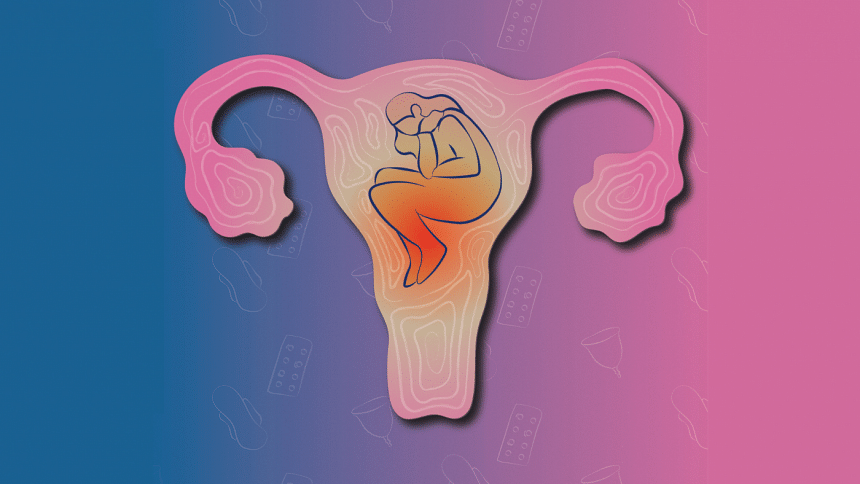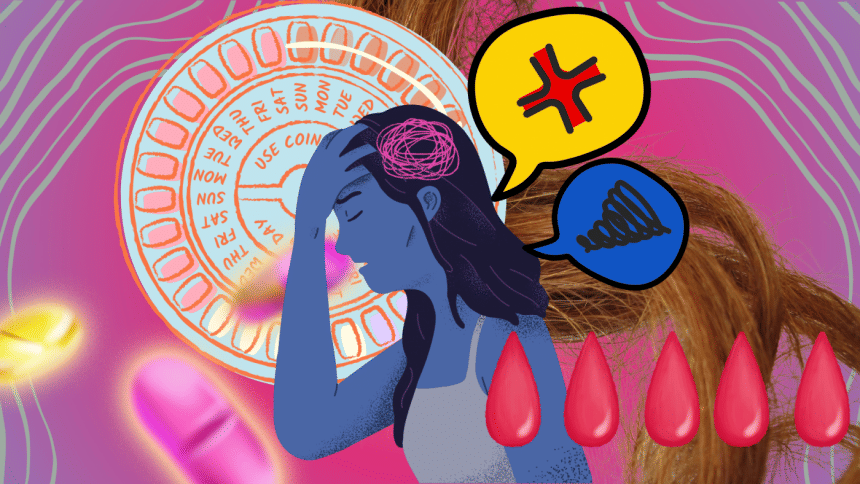The ways PCOS takes over women’s lives

Thanks to being an overweight person with an irregular menstrual cycle, I have been told by doctors of various specialisations, and aunties with no medical training that I might have PCOS. So, I got tested, not just once or twice, but multiple times and through a variety of tests. Turns out, you can have almost all the symptoms of PCOS yet not have PCOS, and vice versa. Which is exactly what makes understanding PCOS difficult yet crucial.
PCOS, or Polycystic Ovary Syndrome, is a multi-causal hormonal condition where an abnormal amount of male sex hormone, or androgen, is produced. As the name suggests, it often causes numerous small fluid-filled sacs or cysts to be formed around the ovaries. While some women develop such cysts without the condition, others do not develop cysts despite having it.
Although PCOS is one of the most common reproductive/hormonal health issues that Bangladeshi women, and even young girls go through, a lot of them remain unaware of their condition until late in their lives. As reproductive health check-ups and regular visits to the gynaecologist are not common in Bangladesh and periods are still considered taboo in most households, most women facing period irregularities only consider going to the doctor when trying to conceive.

Dr. Zakia Sanjari, currently preparing for FCPS Final Part in Gynaecology and Obstetrics, explains, "The patients that we get with PCOS can be divided into two categories. The first group is younger patients with irregular periods; at least 70 percent of them present with obesity. Their main concerns are irregular menstrual cycle, skin conditions and hirsutism (a condition in women that results in excessive growth of dark or coarse hair in a male-like pattern — face, chest and back). The second group is older women in their mid-20s to 30s who are getting married or trying to conceive. They find out they have PCOS when they try to start birth control and realise their periods are not regular or try to conceive and fail to do so."
The exact cause of PCOS is unknown, but it is common to see it in women with a family history of PCOS, insulin resistance, or metabolic syndrome. Due to insulin resistance being linked to obesity, obesity is often seen as a cause of hormonal imbalance and subsequent development of PCOS.
Dr Sanjari further explains, "Among the patients we see for PCOS, almost 70 percent of them present with obesity. When you are obese, you naturally have a higher chance of having high cholesterol and insulin resistance. Both these conditions can cause hormonal imbalances resulting in PCOS. So, doctors who make such assumptions cannot really be blamed."
She continues, "However, there is a certain degree of bias here. Although it is common, obesity does not always mean the patient has insulin resistance or high cholesterol levels. Some people have high body mass but low cholesterol levels. But due to the preconceived notion that being overweight means you must be physically inactive, that you do not burn enough calories, and must have high cholesterol, a lot of healthcare professionals make such assumptions without proper diagnosis."
PCOS can have many symptoms that vary from case to case. Some women have very heavy periods, while others have lighter ones. Some experience longer periods that last for whole months, while others experience an absence of periods for months on end. Many women experience excruciating periods, chronic fatigue, weight gain, acne, hirsutism, skin darkening, etc.
As the symptoms vary, women's experience across the spectrum also varies with PCOS. Nishat Tasnim Anika, a 24-year-old graduate from Dhaka University, says, "I went to the doctor for irregular periods and unwanted hair growth. When I did an ultrasound, it showed that I have PCOS. The doctor never explained to me what it was, why it happened or how to deal with it through lifestyle changes. Instead, she directly prescribed birth control pills which gave me extremely painful periods to the point that I was bedridden during my flow."
"When I visited her again," continues Anika. "I asked for pain management medication, but I was not prescribed anything. So, I just dealt with it. Bear in mind that the pain was so bad, I literally could not walk. One time I got my period during exams. So, I had to do something. Then my friend, who also has very painful periods, suggested a medicine that helped her manage pain. I have been taking it ever since. I honestly have no idea if this will have any adverse effect in the future but I did not know what else to do."

Many women like Nishat are left in the dark about their health condition which makes it difficult for them to manage the symptoms in an efficient manner. What is more concerning, however, is that due to a myriad of confusing information available on the internet, and healthcare professionals who are too quick to prescribe medication to adjust hormone levels instead of suggesting lifestyle changes to patients, a lot of women are taking such medication from an early age.
"The first line of protocol for PCOS is lifestyle changes. Hormonal medication or laparoscopic procedures should only be prescribed to certain patients, not all. So, it is important to consult a doctor, get proper diagnosis and act accordingly," said Dr Sanjari.
Zaima Hamid Zoa, a 27-year-old woman working as the communication manager of CholPori, shares her experience with PCOS, "I got my period really early, too early. Since then, it was always irregular, and I was always given mixed suggestions on regulating my cycle without actually consulting a doctor. I was told I got my period too early because I ate too much chicken. For years I just dealt with my irregular periods without going to a doctor or getting a proper diagnosis."
Zoa continues, "When I got a diagnosis, the doctor said that it's nothing and will go away after marriage. She also said I will have difficulty conceiving in the future. This made my family put constant pressure on me to get married early. My partner at the time was very understanding and loving. We decided to get married. After a month of our marriage, my mother-in-law learned about my condition, shared it with her gynaecologist and told me I should consider conceiving as soon as possible."
Countless women are facing similar situations in Bangladesh when it comes to having PCOS. What doctors often do not consider, however, is the fact that their patient may not even want to get pregnant in the first place. Even if they did, getting married as early as possible and trying to conceive is not the only way to have a healthy child. Freezing eggs and fertility treatments are becoming more and more viable, yet most gynaecologists tend to opt for a conservative approach that borderlines harassment in many cases.

PCOS can lower your pregnancy chances, but it does not make you permanently infertile. In fact, it depends very much from person to person. Sadly, due to the myths that surround PCOS and misconceptions that stem from a lack of knowledge, whenever people hear PCOS, they hear infertility.
Dr Sanjari says, "It is true that many doctors suggest getting married and trying to conceive when a patient comes to them with PCOS. They do it because they are aware of Bangladeshi societal expectations. The strength of a person's ovaries varies from the next one, and conceiving a child also depends on many other factors. However, if the doctor notices that the patient does not have many healthy eggs left and they're in their mid-20s or more, the doctor knows the patient will receive a lot of pressure to have children soon, and by the time they decide to, it might be too late considering their particular case. So in that case, it is only normal that the doctor makes the patient aware of their chances at pregnancy."
She adds, "However, having PCOS does not mean you are infertile. PCOS can have different stages and forms. It's totally possible to manage PCOS and get pregnant without medication, yet not impossible to be unable to do so."
Due to being mostly concerned about fertility, gynaecologists often do not discuss other long-term effects it can have on the body with PCOS patients. Developing type 2 diabetes, heart problems and hypertension being a few of these impacts. They are also at risk of developing certain cancers like ovarian cancer, breast cancer, endometrial cancer etc.
PCOS may be difficult to understand, take effort to manage and show up in different ways in the case of different women. However, it is treatable and manageable and most certainly does not ensure infertility. Living with PCOS is undoubtedly difficult, but awareness about management and compassion from healthcare professionals and family members alike can make the process easier.
References:
1. ScienceDirect (Elsevier). (January 2012). Consensus on women's health aspects of polycystic ovary syndrome (PCOS): the Amsterdam ESHRE/ASRM-Sponsored 3rd PCOS Consensus Workshop Group.
2. John Hopkins Medicine. (n.d.). Polycystic Ovary Syndrome (PCOS)
3. NIH National Library of Medicine. (2009). Long term health consequences of polycystic ovarian syndrome: a review analysis
4. Mayo Clinic, Mayo Foundation for Medical Education and Research. (October, 2021). Hirsutism
Tazreen is a freelance journalist and social science researcher struggling to find her footing in this world. Find her at [email protected].

 For all latest news, follow The Daily Star's Google News channel.
For all latest news, follow The Daily Star's Google News channel. 











Comments